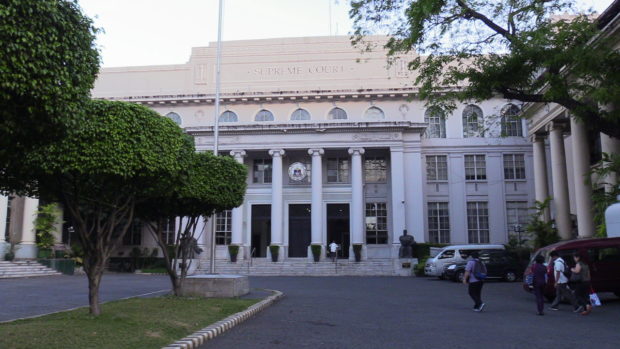
FILE PHOTO: The Supreme Court building on Padre Faura Street in Manila. CATHY MIRANDA / INQUIRER.net
The Supreme Court affirmed the dismissal from service of a former employee of the Department of Foreign Affairs (DFA) who had been convicted of the crime of bigamy.
The DFA employee, who was assigned at the agency’s passport division, assailed the Court of Appeals (CA) rulings that affirmed earlier resolutions by the Civil Service Commission (CSC) dismissing her from the service for her conviction of a crime involving moral turpitude.
The employee’s dismissal was spawned by a complaint-affidavit filed before the CSC in September 2002 alleging that the employee and her husband contracted marriage while the husband was still married to another.
This prompted the complainant to file a criminal case for bigamy before the Regional Trial Court of Lucena City.
The DFA employee and the man pleaded guilty, resulting in their conviction of the crime.
In her counter-affidavit, the employee claimed that she had no knowledge of her husband’s previous existing marriage when she agreed to marry him.
The CSC found the petitioner guilty of the administrative offense of conviction of a crime of moral turpitude and meted the penalty of dismissal from service.
On further appeal, the CA affirmed the CSC’s rulings.
READ: Bigamy and psychological incapacity
In a decision penned by Justice Ramon Paul Hernando, the high court found the employee’s petition “not meritorious,” as it noted that she did not contest that she was guilty of both the administrative and criminal offenses.
“What she assailed was the CSC’s imposition of the penalty of dismissal from service upon the finding of her administrative guilt,” the Supreme Court said.
Grave offense
It added that what the employee had committed was a grave offense that is punishable with dismissal from service upon first commission.
The court held that the CA was correct in not appreciating the mitigating circumstances—such as the length of service, first commission and outstanding performance—that the petitioner invoked.
The length of service cannot be given weight since the subject administrative offense is a grave offense, punishable by dismissal from services, the Supreme Court said.
“Bigamy cannot be taken lightly as its commission reflects the person’s character. It involves moral turpitude as settled in jurisprudence. Petitioner flagrantly disregarded the law … this shows her moral depravity and cast[s] serious doubt on her fitness and integrity to continue in the public service,” the high court said.
It stressed that the rules are clear in stating that a first-time offender shall be dismissed from service.